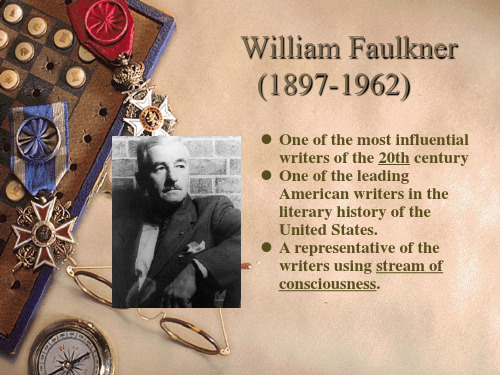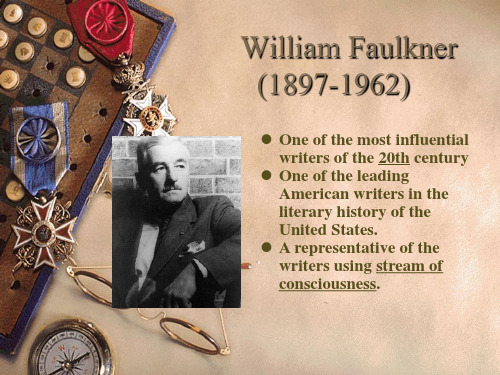william Faulkner
威廉·福克纳

海德格尔认为,时间构成了人的实体或存在。
时间性是现代人的视界,“现代”使时间的意识空前
强化。 萨特认为作品中突出强调的是现在。
海德格尔和萨特都强调人的未来性:“人不是他所有
的一切的总和,而是他还没有而可以有的一切的综 合。”
“杰生的部分”发生在1928年4月6日,这部分写杰生当家
ቤተ መጻሕፍቲ ባይዱ
后康普生家的情况,他是典型的恶棍,从恨的角度讲述凯 蒂和她的私生子小昆丁,认为姐姐的遭遇影响了自己的 前程。
“迪尔西的部分”,则是发生在1928年4月8日(复活节),
它纯粹写当前的事:小昆丁的出走、杰生的狂怒与追寻, 以及象征着涤罪与净化的黑人教堂里的宗教活动。迪尔 西从小生活在康普生家,目睹了这个家族的盛衰。“我 看见了始,我看见了终。”
品中不断寻找的(失落的南方)。
“班吉的部分”发生的时间是1928年4月7日。通过他,福克
纳渲染了康普生家颓败的气氛。另一方面,通过班吉脑中 的印象,反映了康普生家那些孩子的童年。班吉33岁,却 只有3岁儿童的智力水平。
“昆丁的部分”发生在1910年6月2日,这部分交代昆丁当
天的所见所闻和他的活动,同时又通过他的思想活动,写 凯蒂的沉沦与昆丁自己的绝望。于是投河自尽。
《押沙龙,押沙龙!》书名取自《圣经》,本是大卫王
对阴谋篡位被杀身死的爱子押沙龙发出的哀叹,福克纳 借此表达父子反目、兄弟阋墙、命运不可违的悲剧主题。 具有史诗结构和悲剧气氛。
小说表现了庄园主托马斯· 萨德本的盛衰史。他本是乡野
贫穷家庭的一个农家子,因受人歧视感叹命运的不公, 立志奋斗。在白手起家的过程中,他摈弃了一切道德法 规,变成一个毫无人性的“妖魔”。最后,萨德本不仅 自己死于非命,而且也残害了自己的后裔。
William Faulkner威廉 福克纳

him greatly.
✬ In WWI, Faulkner joined the Canadian, and later the British Royal Air.
In1924 his first book of poetry, The Marble Faun, was published.
✬
Sanctuary in 1931 brought him commercial success.
6、william faulkner威廉 福克纳

A Picture of Yoknapatawpha County( a little postage stamp of native soil)
His Main Writings
His major novห้องสมุดไป่ตู้ls :
The Sound and the Fury(1929) As I Lay Dying(1930) Sanctuary(1931) Light in August(1932) Absalom , Absalom !(1936) The Hamlet(1940) His books of short stories:
Detailed Study of the Text
Part I
1.
2.
The street used to house only the best families. Then great changes took place: garages and cotton gins were established on the street and their existence wiped out the aristocratic traces in that neighborhood. While the whole street was becoming modern and commercial, only Miss Emily‟s house remained the same. Although her house was decaying, it still assumed an air of a stubborn and frivolous girl. The cotton wagons and gasoline pumps were ugly enough, but this house, which was old, in decay, pretentious, and completely out of place, was more unpleasant to look at. This detail shows that the house and its owner share the same character. Miss Emily had lived long and had become a tradition because she represented the aristocracy of the Old South that had lost out in the Civil War. She was a care because she was old, unmarried, and without family, and the people in the town felt they must take care of her. They felt that taking care of her was their duty and obligation. This obligation passed from generation to generation as long as she lived.
威廉福克纳 介绍William Faulkner

(P3)人们必须重温这些,必须教会自己:一切事物中最基 本的东西才最值得敬畏;并且,还要教会自己,没齿不忘, 永远在自己的工作室里为亘古不变的心灵的真理留出位置; 离开这些亘古不变的真理,任何小说都注定如浮游朝菌生 命一般地短暂 - -爱或荣誉或怜悯或自豪或同情或牺牲。 如果不这样做,他的一切劳作都会受到魔咒。 他所描绘 的不是爱情而是肉欲,他所记述的失败里不会有人失去任 何有价值的东西,他所描绘的胜利中也没有希望,更没有 同情和怜悯。他的悲哀,缺乏普遍的基础,留不下丝毫痕 迹。他所描述的不是人类的心灵,而是人类的内分泌物。
Main idea
3.Man will not merely endure, he will prevail. He is immortal because he has a soul, a spirit capable of compassion and sacrifice and endurance. (Para.4)
Main idea
1.Only the human heart in conflict with itself is worth writing. (Para.2)
2.The basest of all things is to be afraid. Writers should remember forever that good writing reflects the old verities and truths of the heart, the old universal truths—love and honor and pity and pride and compassion and sacrifice. (Para.3)
福克纳William_Faulkner简介

1929, two novels: Sartoris, The Sound and the Fury 1929-1942, most productive: 2 short-story collections, a
Mr. Compson is an alcoholic. Mrs. Compson is a selfabsorbed hypochondriac who depends almost entirely upon Dilsey to raise her four children. Quentin, the oldest child, is a sensitive bundle of neuroses. Caddy, his sister, is stubborn, but loving and compassionate. Quentin commited suicide after Caddy's losing her virginity and their family's decline. Jason has been difficult and mean-spirited since birth and is largely spurned by the other children. Benjy is severely mentally disabled, an “idiot” with no understanding of the concepts of time or morality.
Part1: Benjy (the youngest son), a fool Part 2: Quentin (the oldest son),a suicide Part 3: Jason (the second son),a cynical man Part 4: Dilsey (the maid), the omniscient view
福克纳William Faulkner简介

Style:
Words are often run together, with no capitalization and no proper punctuation.
Variety of language usage: ranging from colloquial, regional dialects to highly charged courtroom rhetoric, covering a variety of “registers” of the English language.
II. Major Works
19 novels and 4 volumes of short stories (75), two volumes of poetry
His works are regarded as the summit of Southern literature.
The mythical county of Yoknapatawpha: 15 saga novels and most of his short stories; symbol of his works; one of the most famous imaginary places in literature.
Part1: Benjy (the youngest son), a fool Part 2: Quentin (the oldest son),a suicide Part 3: Jason (the second son),a cynical man Part 4: Dilsey (the maid), the omniscient view
2. Nobel Prize Winner(1949) As I Lay Dying(1930) For "his powerful and artistically
21. William Faulkner 福克纳

William Faulkner (1897-1962)
Almost all his heroes turn out to be tragic because they are prisoners of the past, or of the society, or of some social and moral taboos, or of their own introspective persona
The fact that William Faulkner was born into a Southern family with a fairly long tradition is perhaps the most important of all the influences that made him a major writer in American literature.
William Faulkner (1897-1962)
During the next ten years he continued to work on his Yoknapatawpha county. His major works such as Light in August (1932), Absalom, Absalom! (1936), and Go Down, Moses (1942) appeared one after another.
William Faulkner (1897-1962)
He writes about the histories of a number of southern aristocratic families and traces them back to the very beginning when the Chickasaw Indians were still lawful owners of the land.
英语故事-William Faulkner

英语故事William Faulkner威廉·福克纳,美国文学史上最具影响力的作家之一,意识流文学在美国的代表人物,1949年诺贝尔文学奖得主,获奖原因为“因为他对当代美国小说做出了强有力的和艺术上无与伦比的贡献”。
William FaulknerWilliam Faulkner (September 25, 1897 – July 6, 1962) was a Noble Prize-Winning American author. One of the most influential writers of the 20th century, his reputation is based on his novels, novellas and short stories. He was also a published poet and an occasional screenwriter.Most of Faulkner’s works are set in his native stateof Mississippi. He is considered one of the most important southern writers along with mark twain, Robert Penn Warren, Flannery O’Connor, Truman Capote, Eudora Welty, and Tennessee Williams. While his work was published regularly starting in the mid 1920s, Faulkner was relatively unknown before receiving the 1949 Nobel Prize in literature. Since then, he has often been cited as one of the most important writers in the history of American literature.WritingFrom the early 1920s to the outbreak of WWII, when Faulkner left for California, he published 13 novels and numerous short stories, the body of work that grounds his reputation and for which he was awarded the Nobel Prize at the age of 52. this prodigious output, mainly driven by an obscure writer’s need for money, includes his most celebrated novels such as the Sound and the Fury (1929), As I Lay Dying (1930),Light in August (1932), and Absalom, Absalom! (1936). Faulkner was also a prolific writer of short stories. His first short story collection, These 13 (1931), includes many of his most acclaimed (and most frequently anthologized) stories, includes “A Rose for Emily”, “Red Leaves”, “That Evening Sun”, and “Dry September”. Faulkner set many of his short stories and novels in Yoknapatawpha County—based on, and nearly geographically identical to, Lafayette County, of which his hometown of Oxford, Mississippi is the county seat. Yoknapatawpha was Faulkner’s “postage stamp”, and the bulk of work that it represents is widely considered by critics to amount to one of the most monumental fictional creations in the history of literature three novels, the hamlet, the town and the mansion, known collectively as the Snopes Trilogy, document the town of Jefferson and its environs as an extended family headed by Flem Snopes insinuates itself into the lives and psyches of the general populace. It is a stage wherein rapaciousness and decay come to the fore in a world where such realities were always present, but never so compartmentalized and well defined; their sources never so easily identifiable.Characterized by André Malraux as “the intrusion of Greek tragedy into the detective story.” its themes of evil and corruption, bearing southern gothic tones, resonate to this day. Requiem for a nun (1951), a play/novel sequel to sanctuary, is the only play that Faulkner published, except for his the marionettes, which he essentially self-published -- in a few hand-written copies -- as a young man.Faulkner is known for an experimental style with meticulous attention to diction and cadence. In contrast to the minimalist understatement of his contemporary Ernest Hemingway, Faulkner made frequent use of “stream of consciousness”in his writing, and wrote often highly emotional, subtle, cerebral, complex, and sometimes gothic or grotesque stories of a wide variety of characters including former slaves or descendants of slaves, poor white, agrarian, or working-class southerners, and southern aristocrats. In an interview with the Paris review in 1956, Faulkner remarked, “let the writer take up surgery or bricklaying if he isinterested in technique. There is no mechanical way to get the writing done, no shortcut. The young writer would be a fool to follow a theory. Teach yourself by your own mistakes; people learn only by error. The good artist believes that nobody is good enough to give him advice. He has supreme vanity. no matter how much he admires the old writer, he wants to beat him.”another esteemed southern writer, Flanner O’Connor, stated that, “the presence alone of Faulkner in our midst makes a great difference in what the writer can and cannot permit himself to do. nobody wants his mule and wagon stalled on the same track the Dixie limited is roaring down.”Faulkner also wrote two volumes of poetry which were published in small printings, The Marble Faun (1924) and A Green Bough (1933), and a collection of crime-fiction short stories, Knight’s Gambit (1949).AwardsIn 1946, Faulkner was one of three finalists for the first Ellery Queen Mystery Magazine Award. He came in second to Manly Wade Wellman. Faulkner received the 1949 Nobel Prize for literature for “his powerful and artistically unique contribution to the modern American novel.”though he won the Nobel Prize for 1949, it was not awarded until the 1950 awards banquet, when Faulkner was awarded the 1949 prize and Bertrand Russell the 1950 prize. He donated a portion of his Nobel winnings “to establish a fund to support and encourage new fiction writers,” eventually resulting in the Pen/Faulkner award for fiction. He donated another portion to a local oxford bank to establish an account to provide scholarship funds to help educate African-American education majors at nearby rust college in holly springs, Mississippi. Faulkner won two Pulitzer Prizes for what are considered as his “minor”novels: his 1954 novel A Fable, which took the Pulitzer in 1955, and the 1962 novel, The Reivers, which was posthumously awarded the Pulitzer in 1963. He also won two National Book awards, first for his collected stories in 1951 and once again for hisnovel A Fable in 1955. On August 3, 1987, the United States postal service issued a 22-cent postage stamp in his honor.。
- 1、下载文档前请自行甄别文档内容的完整性,平台不提供额外的编辑、内容补充、找答案等附加服务。
- 2、"仅部分预览"的文档,不可在线预览部分如存在完整性等问题,可反馈申请退款(可完整预览的文档不适用该条件!)。
- 3、如文档侵犯您的权益,请联系客服反馈,我们会尽快为您处理(人工客服工作时间:9:00-18:30)。
I feel that this award was not made to me as a man, but to my work -- a life's work in the agony and sweat of the human spirit, not for glory and least of all for profit, but to create out of the materials of the human spirit something which did not exist before. So this award is only mine in trust. It will not be difficult to find a dedication for the money part of it commensurate with the purpose and significance of its origin. But I would like to do the same with the acclaim too, by using this moment as a pinnacle from which I might be listened to by the young men and women already dedicated to the same anguish and travail, among whom is already that one who will some day stand here where I am standing.
Our tragedy today is a general and universal physical fear so long sustained by now that we can even bear it. There are no longer problems of the spirit. There is only the question: When will I be blown up? Because of this, the young man or woman writing today has forgotten the problems of the human heart in conflict with itself which alone can make good writing because only that is worth writing about, worth the agony and the sweat.
He must learn them again. He must teach himself that the basest of all things is to be afraid; and, teaching himself that, forget it forever, leaving no room in his workshop for anything but the old verities and truths of the heart, the old universal truths lacking which any story is ephemeral and doomed -- love and honor and pity and pride and compassion and sacrifice. Until he does so, he labors under a curse. He writes not of love but of lust, of defeats in which nobody loses anything of value, of victories without hope and, worst of all, without pity or compassion. His griefs grieve on no universal bones, leaving no scars. He writes not of the heart but of the glands.
Until he relearns these things, he will write as though he stood among and watched the end of man.
I decline to accept the end of man. It is easy enough to say that man is immortal simply because he will endure: that when the last ding-dong of doom has clanged and faded from the last worthless rock hanging tideless in the last red and dying evening, that even then there will still be one more sound: that of his puny inexhaustible voice, still talking. I refuse to accept this. I believe that man will not merely endure: he will prevail. He is immortal, not because he alone among creatures has an inexhaustible voice, but because he has a soul, a spirit capable of compassion and sacrifice and
endurance.
The poet's, the writer's, duty is to write about these things. It is his privilege to help man endure by lifting his heart, by reminding him of the courage and honor and hope and pride and compassion and pity and sacrifice which have been the glory of his past. The poet's voice need not merely be the record of man, it can be one of the props, the pillars to help him endure and prevail.。
